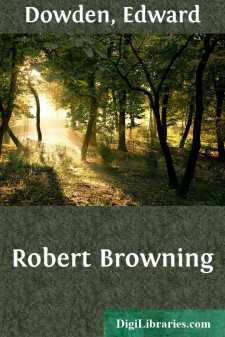Categories
- Antiques & Collectibles 13
- Architecture 36
- Art 48
- Bibles 22
- Biography & Autobiography 813
- Body, Mind & Spirit 142
- Business & Economics 28
- Children's Books 15
- Children's Fiction 12
- Computers 4
- Cooking 94
- Crafts & Hobbies 4
- Drama 346
- Education 46
- Family & Relationships 57
- Fiction 11828
- Games 19
- Gardening 17
- Health & Fitness 34
- History 1377
- House & Home 1
- Humor 147
- Juvenile Fiction 1873
- Juvenile Nonfiction 202
- Language Arts & Disciplines 88
- Law 16
- Literary Collections 686
- Literary Criticism 179
- Mathematics 13
- Medical 41
- Music 40
- Nature 179
- Non-Classifiable 1768
- Performing Arts 7
- Periodicals 1453
- Philosophy 64
- Photography 2
- Poetry 896
- Political Science 203
- Psychology 42
- Reference 154
- Religion 513
- Science 126
- Self-Help 84
- Social Science 81
- Sports & Recreation 34
- Study Aids 3
- Technology & Engineering 59
- Transportation 23
- Travel 463
- True Crime 29
Robert Browning
by: Edward Dowden
Categories:
Description:
Excerpt
Chapter I
The ancestry of Robert Browning has been traced to an earlier Robert who lived in the service of Sir John Bankes of Corfe Castle, and died in 1746. His eldest son, Thomas, "was granted a lease for three lives of the little inn, in the little hamlet of East Woodyates and parish of Pentridge, nine miles south-west of Salisbury on the road to Exeter." Robert, born in 1749, the son of this Thomas, and grandfather of the poet, became a clerk in the Bank of England, and rose to be principal in the Bank Stock Office. At the age of twenty-nine he married Margaret Tittle, a lady born in the West Indies and possessed of West Indian property. He is described by Mrs Orr as an able, energetic, and worldly man. He lived until his grandson was twenty-one years old. His first wife was the mother of another Robert, the poet's father, born in 1781. When the boy had reached the age of seven he lost his mother, and five years later his father married again. This younger Robert when a youth desired to become an artist, but such a career was denied to him. He longed for a University education, and, through the influence of his stepmother, this also was refused. They shipped the young man to St Kitts, purposing that he should oversee the West Indian estate. There, as Browning on the authority of his mother told Miss Barrett, "he conceived such a hatred to the slave-system ... that he relinquished every prospect, supported himself while there in some other capacity, and came back, while yet a boy, to his father's profound astonishment and rage." At the age of twenty-two he obtained a clerkship in the Bank of England, an employment which, his son says, he always detested. Eight years later he married Sarah Anna, daughter of William Wiedemann, a Dundee shipowner, who was the son of a German merchant of Hamburg. The young man's father, on hearing that his son was a suitor to Miss Wiedemann, had waited benevolently on her uncle "to assure him that his niece would be thrown away on a man so evidently born to be hanged." In 1811 the new-married pair settled in Camberwell, and there in a house in Southampton Street Robert Browning—an only son—was born on May 7, 1812. Two years later (Jan. 7, 1814) his sister, Sarah Anna—an only daughter—known in later years as Sarianna, a form adopted by her father, was born. She survived her brother, dying in Venice on the morning of April 22, 1903.
Robert Browning's father and mother were persons who for their own sakes deserve to be remembered. His father, while efficient in his work in the Bank, was a wide and exact reader of literature, classical as well as modern. We are told by Mrs Orr of his practice of soothing his little boy to sleep "by humming to him an ode of Anacreon," and by Dr Moncure Conway that he was versed in mediaeval legend, and seemed to have known Paracelsus, Faustus, and even Talmudic personages with an intimate familiarity. He wrote verses in excellent couplets of the eighteenth century manner, and strung together fantastic rhymes as a mode of aiding his boy in tasks which tried the memory....



